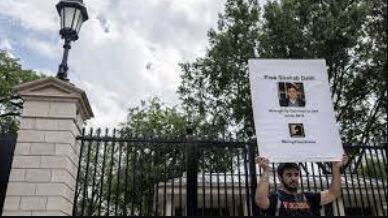Desperate Father-Son Hunger Strike Outside White House Puts Focus on US Citizen's Unjust Captivity in Iran
An Iranian immigrant and his son resort to extreme measures to fight for the father's freedom after he is left out of a recent deal to release imprisoned US citizens in Iran. The son engages in a hunger strike outside the White House in a desperate attempt to draw attention to his father's plight. Meanwhile, the State Department emphasizes that the review process for wrongfully detained cases is still ongoing. The international community anxiously awaits a resolution to end the suffering of those unjustly imprisoned.
In a heartbreaking turn of events, an Iranian immigrant, Shahab Dalili, and his son, Darian Dalili, have taken extreme measures to fight for Shahab's freedom after he was left out of a recent deal to release US citizens imprisoned in Iran.
Shahab Dalili, who is a US permanent resident but not a citizen, was convicted on espionage-related charges in 2016 and has been serving a 10-year prison sentence in Tehran, which he vehemently denies. The news of the deal, which was made public on Thursday, came as a devastating blow to the Dalili family.
Darian Dalili, who resides in Massachusetts, rushed to Washington in a desperate attempt to draw attention to his father's unjust captivity. Speaking about the exclusion of his father from the deal, Darian expressed his anguish, stating, "It feels as if my plight and my family's plight apparently don't matter. I don't know how else to put it."
He further added that his father, too, would have been a US citizen if he hadn't been taken hostage. In an act of solidarity, Shahab Dalili, from inside Tehran's Evin prison, contacted his son to initially dissuade him from resorting to a hunger strike.
However, moved by his son's determination, Shahab joined him in the hunger strike. Darian, who has positioned himself in Lafayette Park outside the White House, has been consuming nothing but water since Saturday. His hope is to elicit a response and prompt action from the American government, emphasizing that this is a move born out of desperation.
However, the State Department has stated that Shahab Dalili has not been formally designated as wrongfully detained, with the review process for such cases still ongoing. Secretary of State Antony Blinken confirmed on Thursday that, according to current information, no more US citizens were known to be held captive in Iran. The five prisoners mentioned in the deal have been transferred to house arrest as a preliminary step.
Meanwhile, calls have also been made to include Jamshid Sharmahd, a German citizen who lived in California and has been sentenced to death, in the agreement. The State Department acknowledges the reprehensible treatment of Sharmahd by Tehran but asserts that it falls under Germany's responsibility to address his case.
In addition to the release of the American detainees, the deal also involves the release of frozen Iranian oil revenue amounting to $6 billion. South Korea will unfreeze these funds, in compliance with US sanctions, and transfer them to a humanitarian account in Qatar.
The Dalili's hunger strike continues, serving as a poignant reminder of the urgency and human cost associated with resolving the issue of Americans and others wrongfully detained abroad. As the incident unfolds, the international community watches attentively, hopeful for a swift resolution that will bring an end to the suffering of those unjustly imprisoned.




